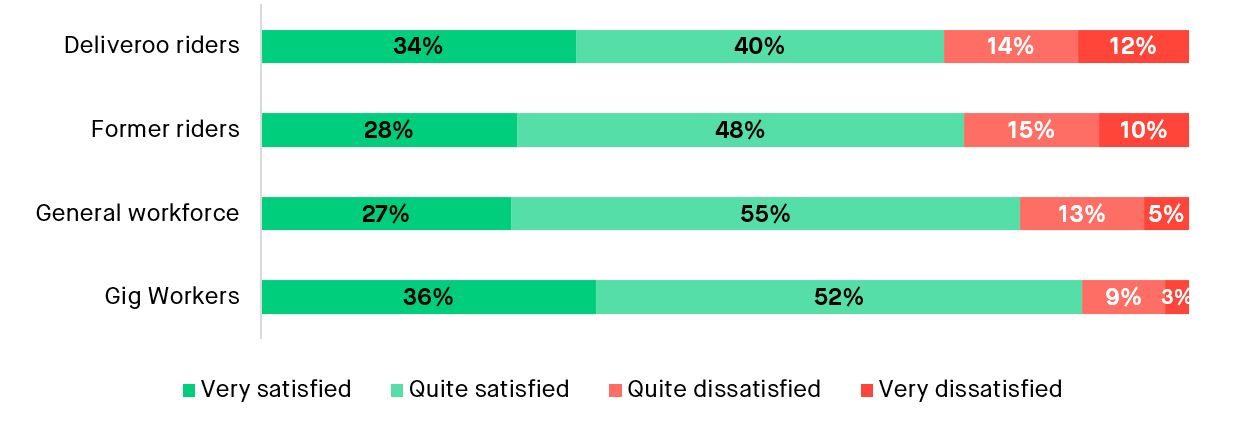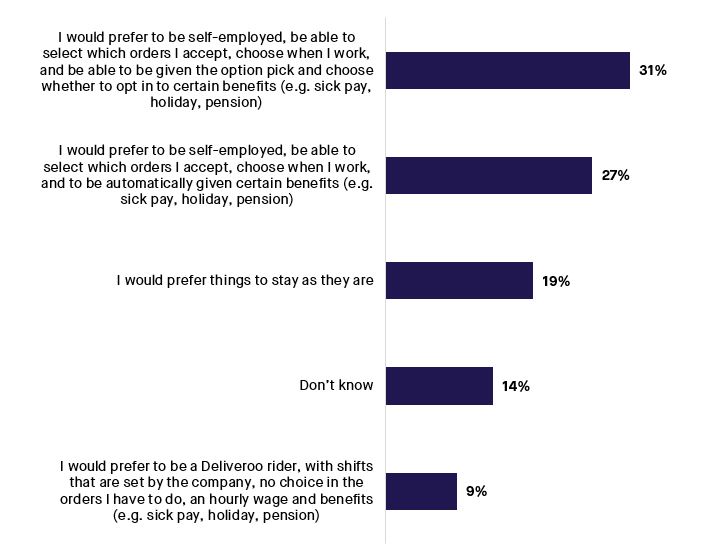Deliveroo riders and other gig economy workers actively choose their work and are as happy with it as the rest of the workforce, new think-tank research reveals today.
A major survey of Deliveroo riders shows that a clear majority are content with their work with the company and want to remain self-employed rather than become conventional employees.
The research was carried out by the Social Market Foundation, which surveyed more than 7,000 Deliveroo riders, as well as hundreds of former riders. Surveys were also conducted with people working elsewhere in the gig economy, and with a sample of workers across the whole of the economy. The SMF also carried out focus groups with riders and ex-riders.
Gig economy workers in general, including Deliveroo riders, are more likely than the general workforce to be happy with the flexibility, control, training, and earnings their work gives them, the SMF found.
The report concludes: “Most Deliveroo riders consider riding with Deliveroo to be good work, and choose it deliberately because they value its autonomy and flexibility. They are as happy with their work as people in conventional employment. They make an informed choice to ride with Deliveroo in preference to other activities, often because they value the flexibility this offers more highly than they prize the characteristics of conventional employment.”
The project was sponsored by Deliveroo, which signed a legal contract with the SMF ensuring the think-tank’s complete independence over its work and report. The SMF is a charity overseen by a board of independent trustees.
The SMF’s key findings:
- Deliveroo riders are as happy as other members of the workforce. 74% of current Deliveroo riders say they are satisfied or very satisfied with their work, broadly in line with the 82% finding for the workforce as a whole. Deliveroo riders are more likely to have strong feelings about their work than other people. 34% of Deliveroo riders are “very satisfied” compared to 27% of the whole workforce. 12% of riders are “very dissatisfied” compared to 5% of the general workforce. (See Chart 1)
- Riders choose Deliveroo in preference to other work. The majority came from employment, with only one in five unemployed, on furlough or looking for work before starting on the platform. Most believe they could have found other forms of work if they wanted. Only 12% did not think they could have found work without Deliveroo.
- Riders prize flexibility more highly than people working in other sectors. 40% of Deliveroo riders put the ability to choose their hours in their top five criteria for choosing work, compared to 20% of the general workforce. 93% of Deliveroo riders and 72% of all gig workers are happy with the flexibility they have over work, compared to 65% of the general workforce. (See Chart 2)
- Riders are motivated by money, just like the rest of the workforce. Most riders say they are satisfied with their earnings, and 57% believe that they earn more riding with Deliveroo than they could do in comparable work. 55% say they are satisfied or very satisfied with pay, compared to 53% for the workforce in general. 23% of riders say they are dissatisfied with their earnings, exactly the same as in the general workforce. (See Chart 2)
- Riders favour their current legal status, recognising the trade-offs it entails. Most riders would be unwilling to sacrifice flexibility or earnings for more generous benefits. The vast majority (91%) do not want to become employees, though most would like to combine self-employment status with more benefits. (See Chart 3)
- Riders can see Deliveroo as a primary source of income. While 60% of riders have other forms of work, nearly a quarter say over 70% of their income comes from riding with Deliveroo.
- Riders see Deliveroo work as a long-term option. One in three current riders say they intend to still be riding with Deliveroo in five years’ time; one in five say they expect to be doing so in ten years.
The report was written by Dr Aveek Bhattacharya, the SMF’s chief economist. He said:
“The evidence we have gathered in this report shows that on many measures, Deliveroo riders are at least as happy as those elsewhere in the workforce, a level of satisfaction that has been recorded under the existing policy framework around the gig economy. Policymakers should consider this evidence carefully when it comes to the gig economy.
Deliveroo and the gig economy arouse strong feelings on all sides. Deliveroo riders are more likely than other people in the workforce to say they are very satisfied with their work. At the same time, some do have concerns and riders are more likely than others say they’re very unsatisfied. But this should be put in context: unhappy riders are a minority, and happy riders outnumber them by three to one.”
James Kirkup, the Director of the SMF, said:
“Some political narratives about the gig economy suggest that the people who work in it are unhappy and exploited and have no choice about how they earn a living, but this report shows that those narratives are at odds with the facts.
This report shows that Deliveroo riders, and gig workers in general, are as happy in their work as other workers. More important, they are aware of the trade-offs and consequences that flow from working in the gig economy – and they choose to do that work on the basis of that knowledge. They are not victims. They are economic actors making informed choices about how and where to use their time.
The SMF’s research on Deliveroo riders was carried out entirely independently and brings important new evidence to the debate about the gig economy. We surveyed more than 9,000 people in all, and we have published what we found. Anyone involved in debates about the gig economy should listen to the voices of the people we heard from in this research.”
A spokesperson for Deliveroo said:
“This report underlines that the overwhelming majority of Deliveroo riders value the flexibility that comes with self-employment above all else. Riders want control over their own working patterns to be balanced with security, which is why Deliveroo ensures all UK riders are insured, are supported financially if they are unwell and cannot work or if they have become a new parent, and have access to free online learning courses.
Thousands of people are choosing self-employed platform work because of the benefits it brings, even when it is easier than ever to find employed work. The debate over the future of on-demand work should focus more on what riders and other platform workers really want, which is flexibility and security together.”
Chart 1: Overall job satisfaction

Source: SMF Deliveroo Current & Former Riders Surveys; SMF Opinium General Workforce & Wider Gig Economy Surveys July 2021
Chart 2: Proportion of respondents satisfied with the following aspects of their work

Source: SMF Deliveroo Current & Former Riders Surveys; SMF Opinium General Workforce & Wider Gig Economy Surveys July 2021
Chart 3: “Which of the following options best describes your views?”

Source: SMF Deliveroo Current Riders Survey July 2021
NOTES
- The report, Rides and responsibilities, was published at 09:00 AM on 29th November 2021 at smf.co.uk/publications/rides-and-responsibilities/
- This project was sponsored by Deliveroo. The SMF retained full editorial independence, guaranteed in a legal contract between the think-tank and the company.
- SMF surveyed over 9,000 people – 7,000 current Deliveroo riders, but also former riders and workers elsewhere in the gig economy and general workforce. Surveys were distributed by Opinium.
- We also conducted eight focus groups – seven with current Deliveroo riders, one with people that had left the platform. Deliveroo shared some aggregated internal data on rider demographics, hours and earnings.
- The research methods devised for the project were independently reviewed by a panel of SMF trustees and advisors: Professor Wendy Thomson of the University of London; Professor Tim Bale of the Queen Mary University; and Giles Wilkes of the Institute for Government.
CONTACT
- For any media enquiries, please email press@smf.co.uk
